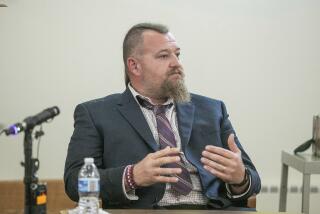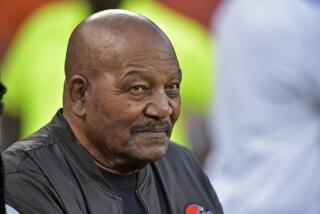All Charges in Brown Kidnap Case Dismissed : Courts: The charges never should have come to trial, the judge tells stunned attorneys on both sides in the religious deprogramming attempt on Ginger Brown.
- Share via
In an abrupt conclusion to the Ginger Brown kidnaping trial, Superior Court Judge David B. Moon Jr. on Friday dismissed the kidnaping and other charges against all five defendants, including the woman’s parents, Earle and Dorothy Brown.
“Back in June, when I reviewed the entire file, I said to myself, ‘Why is this case, at least to the Browns, in our criminal courts?’ ” Moon said Friday morning, surprising attorneys for both sides, who had gathered to argue whether charges that led to a hung jury on Thursday should be retried.
Instead, Moon told them he didn’t see any reason to try the case further. “This judge finds that no jury of 12 persons is ever going to unanimously agree on guilty verdicts,” he said.
“The chances of a prosecution on the remaining counts is virtually non-existent. Perhaps a jury might reach a unanimous not-guilty verdict, but this judge isn’t going to let the people’s courtroom, of which we have precious few, be used to titillate the public’s fascination with unusual religious groups. We have other pressing business to transact in our trial courts.
“Our Constitution admonishes me to conduct a fair trial; it authorizes me to protect the rights of criminally accused, and it expects me to curb excessive government action.
“Accordingly, I conclude that further prosecution of these defendants on outstanding charges would serve no legal purpose.”
The five defendants hugged, cried and smiled; the defense attorneys grinned and shook their heads, and the district attorney’s office shrugged it off.
“In a sense, everybody in this case did his or her job,” said Steven J. Casey, special assistant to Dist. Atty. Edwin Miller. “We’re obliged to uphold the law. Nobody in a free community is going to tolerate a society where anyone can be Big Brother and rip someone off the streets when they disagree with them philosophically.
“The court’s job is to give the defendants and the victim a fair trial,” Casey said. “Ultimately, it’s the community’s job to speak out on this case--and essentially the whole sorry story of alienated families--and the jury has done that.
“Perhaps their failure to reach a decision tells a great deal about the deep ambivalence we have as a society, between family duty and personal freedom.”
Charged with kidnaping, false imprisonment and battery were the elder Browns; one of their four daughters, Holly, 25; Los Angeles deprogrammer Clifford Daniels, 35, and Hank Erler, 23, in whose mother’s Escondido home the unsuccessful five-day deprogramming attempt occurred in May, 1988.
The jury Wednesday acquitted Erler of most of the charges facing him, and pronounced not-guilty verdicts on false-imprisonment and battery against the two Brown women. But Thursday, jurors said they were hopelessly deadlocked on the remaining charges, including kidnaping, against the three Browns and Daniels.
The five defendants never denied abducting and holding Ginger Brown for five days to try to get her to disavow her allegiance to a group known as Great Among the Nations. But they argued that they were baited to do it by Ginger Brown and the group’s leader, Benjamin Altschul, so the daughter could later sue the defendants for monetary damages to help bankroll the small group.
The 17-member, Coronado-based Great Among the Nations describes itself as a fundamental Christian Bible study and evangelism ministry, although parents of current and former members say it is a cult whose members are insidiously influenced to finance the comfortable life style of its leader.
Ginger Brown was freed on the fifth day of the deprogramming effort and returned to her group. She was the prosecution’s star witness against her parents and the others.
Brown, who was 22 at the time, testified that she was bruised and battered during the deprogramming attempt. The defense argued that most of her injuries were self-inflicted so she could improve her case.
Brown said Friday that she accepts Moon’s ruling. “I laid out my case to the court, the jury and the judge. It was up to them. It’s time to go on with my life and my ministery,” she said.
Jurors said afterward that the very issue of whether Ginger Brown actually baited the kidnaping and consented to it was the key to their deliberations, and those who voted for acquittal said they didn’t believe Ginger Brown’s story.
“The only thing we agreed on was that nobody believed Ginger told the truth,” juror Jim Lambert said. “There were so many inconsistencies, we just didn’t believe her.”
He added: “We all agreed we were dealing with a cult.” But he said some jurors “seemed to have chips on their shoulders because of their problems with their own parents” and weren’t ready to wholly support the elder Browns, either.
Jurors noted that all four women on the jury voted across the board to acquit all the defendants on all the charges, but most said sympathy for the parents wasn’t an issue.
“We believed the Browns had evidence (their daughter was in jeopardy), even though we didn’t have that evidence ourselves,” said Paula DeMong, the presiding juror. “We saw it as a group that wouldn’t allow Ginger to see her family. No one felt that the motives of Great Among the Nations were particularly honest.”
DeMong said that, if she didn’t believe Ginger Brown had consented to the kidnaping, “I would have voted to convict them--with great sadness.”
Some jurors said they were struck by Ginger Brown’s emotionless, matter-of-fact testimony against her parents.
“She seemed so odd. It made the jury curious, that she wasn’t experiencing normal emotions, which we felt added weight to the brainwashing,” DeMong said.
She said jurors were bothered after viewing a videotape of Ginger Brown, taken by fellow group members after her release, that showed her laughing and joking about the experience.
Ginger Brown said she was not bothered by their criticism. “There has been such slander against our group for the past two years that I’m beginning to get thick-skinned,” she said.
Friday’s proceedings started with Deputy Dist. Atty. Gary Rempel telling Moon he was ready to retry the defendants on the hung counts and to continue his prosecution of them on several yet untried charges of conspiracy--charges that were held in abeyance until the first charges were tried and resolved.
But Moon brought the discussion to a quick culmination, telling defense attorneys not to even bother to argue that charges should be dropped.
Then, in a 20-minute lecture in which he criticized both the defense and prosecution for some of their trial tactics and missed opportunities, Moon said he was dropping the remaining charges and was ready for everyone to go home.
Moon said he found fault with the case from the outset, but claimed he lacked the judicial discretion to unilaterally dismiss the major counts against the defendants--especially after Earle Brown took the stand in his own defense and “virtually admitted every element of the crime and implicated each of his co-defendants,” despite “deficiencies in the prosecution’s prima facie case.”
Had the defendants asked that the judge rule on the case instead of putting the facts in the hands of a jury, Moon said, he might have ended the proceedings shortly after they started, back in November. But instead, he said, he had to let the jury process run its course.
“This prosecution will never, and I mean never ever, be stronger than it was at the conclusion of the defense case,” Moon said. “To put it succinctly, if the district attorney couldn’t get a conviction from this evidence, they will never get a conviction.
“This jury heard a functional equivalent of a judicial, in-court confession. It was not misled by having religion put on trial. But it did hear a rather tragic story of a daughter’s alienation from her family.
“Perhaps it was this last human--but relevant--portion of the case that had the jury considering jury nullification,” Moon said, referring to the jury’s dilemma of hearing hard evidence suggesting a technical violation of the law, but not wanting to apply the law against the Browns.
The district attorney’s office agreed later that it had a hard case to try.
“You’ve identified a very thorny issue, which some would argue is fatal to this kind of prosecution,” Casey said. “This isn’t a difficult case because of the facts. It isn’t difficult because of the law. It’s difficult because of the people. This is not a robbery case. It’s a ‘Father Knows Best’ case.
“You have a family of people we (prosecutors) have characterized as good and decent and nice people who felt themselves driven to a desperate act, out of love. Unfortunately,” said Casey, “that act is illegal.”
Casey said prosecutors aren’t second-guessing their decision to pursue the case, despite Moon’s remarks from the bench.
“They admitted forcibly taking an adult woman who was violating no law off the street and holding her against her will.
“The judge observed in his comments that Earle Brown admitted virtually every allegation--he copped out on the witness stand--and still the jury didn’t convict because of what the judge called the equities and we call sympathy. Perhaps from a legal standpoint that’s disappointing and from a human standpoint it’s heartening.”
For his part, Rempel, the prosecutor, said he found the judge’s dismissal acceptable. “What we have are two people in the business of law who are disagreeing on the application of the law. It’s a philosophical, not emotional, argument.”
Then, turning to Daniels, he said: “Congratulations. You’re lucky.”
Daniels said he was “deeply humbled” by Moon’s ruling. “I’m so relieved I can barely stand up,” Daniels said. “I’ll be celebrating for a long, long time.”
One of the defense attorneys, Charles Duff, credited Moon for acting “courageously” but added, “He must have realized that public opinion was on our side. He finally became aware the people in this county didn’t want this prosecution.”
Another defense attorney, Herb Weston, said of the dismissal, “Not bad, for a defenseless case.”
Earle Brown’s attorney, Saul Wright, said that, although he was delighted by the resolution, “I’m sorry it took us this long. This case should never have gotten this far.”
To a one, the five defense attorneys said they were astonished by Moon’s decision, especially given the judge’s rulings, which they said had consistently gone against their case--including his fundamental ruling that the Browns could not be defended on the basis that they were motivated by a sense for Ginger Brown’s welfare.
“If he was for us all the time,” said Weston, “he sure didn’t show it.”
Added attorney John Patterson, “For once, the judge was right.”
Among the options available to the court were to drop the charges against all but Daniels, who was considered by most jurors as the most likely to face a conviction because of his professional role in the snatching.
Moon said Daniels “has successfully hidden behind the Brown family shield.” But he said that, since the prosecution chose to include Daniels among the five co-defendants, it shouldn’t have “a second chance” to prosecute him alone.
“I do not condone any of Mr. Daniels’ actions. In my view, they were outside the law,” Moon said. But he then wondered aloud whether kidnaping laws can be applied to these sorts of cases.
“It may be argued that the prosecution of these deprogramming kidnaping cases deter abductions (of relatives) and deter vigilantes. Perhaps our society will always struggle with this phenomenon,” Moon said. But he suggested that new laws be written to specifically address the abduction of family members for deprogramming purposes.
Altschul said Friday that “everybody is relieved that we can go on to do our business.”
“However, there’s a great need, a great desire on Ginger’s part, to have her family come over to our side and become good Christians, to shake hands and ask for an excuse. Mr. Brown should stop excluding Ginger as a daughter because she doesn’t go to his church,” Altschul said.
“He needs not to be a member, but to look at the fact that we are a church, not a cult, and there will be no harm to learn more about us. It’s time for him to do that. He needs to accept his daughter and what she’s doing.”
Ginger Brown said she is looking to her father to apologize to her. “There was a definite wrongdoing against me,” she said. “The next step would be for my dad to apologize to me, my church and especially my pastor. That would be a start.”
But Earle Brown said he was still “really concerned about Ginger and her well-being--and for other parents with children in this situation.” He said he stood ready to reconcile with his daughter, but was not ready to apologize for his actions. “I don’t know what there is to apologize for,” he said.
To that, Rempel remarked: “When the Browns get home, they’ll realize they may have traded their daughter for a surrogate son (Daniels), and paid $20,000 to do it. Is that a bargain?”
Ginger Brown’s $2.5-million lawsuit against her parents and the others involved in the deprogramming attempt remains filed in court.
Casey said the district attorney’s office had not yet decided whether to appeal Moon’s dismissals.
Times staff writer Alan Abrahamson contributed to this story.
More to Read
Sign up for Essential California
The most important California stories and recommendations in your inbox every morning.
You may occasionally receive promotional content from the Los Angeles Times.













